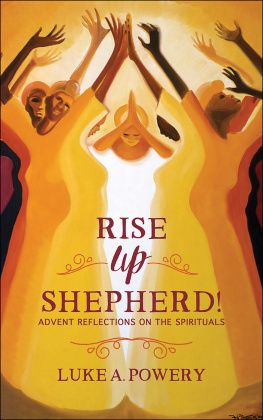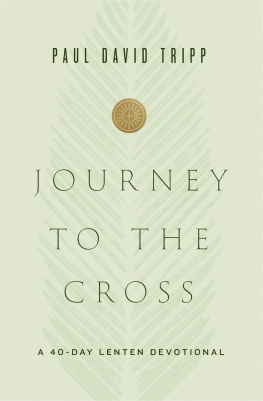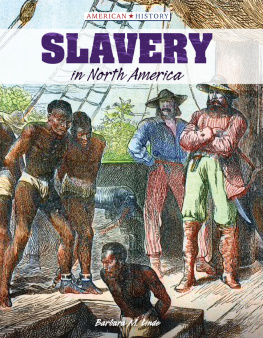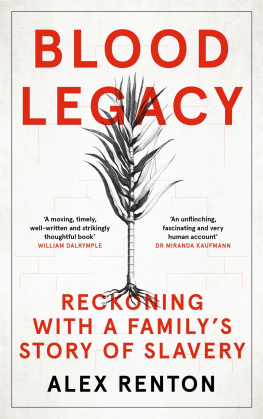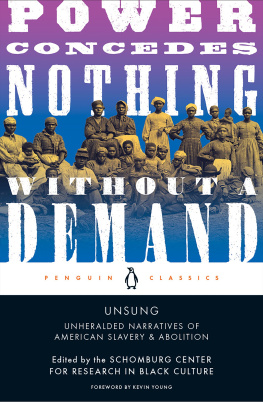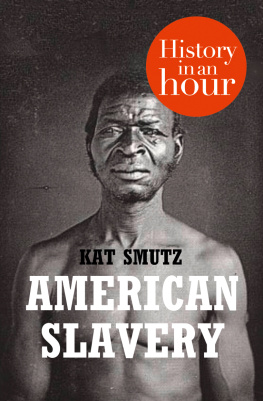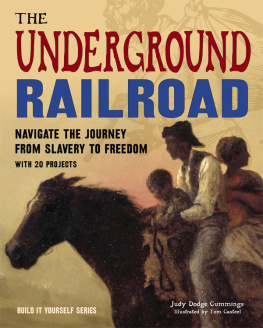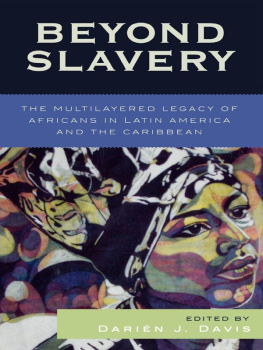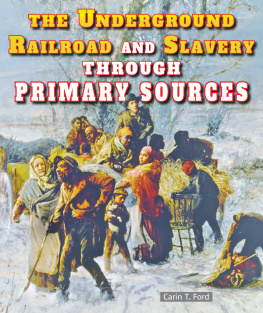Lent of Liberation
Find digital resources for study and preaching at www.wjkbooks.com/LentOfLiberation.
Lent of Liberation
Confronting the Legacy
of American Slavery
C HERI L. M ILLS

2021 Cheri L. Mills
First edition
Published by Westminster John Knox Press
Louisville, Kentucky
21 22 23 24 25 26 27 28 29 3010 9 8 7 6 5 4 3 2 1
All rights reserved. No part of this book may be reproduced or transmitted in any form or by any means, electronic or mechanical, including photocopying, recording, or by any information storage or retrieval system, without permission in writing from the publisher. For information, address Westminster John Knox Press, 100 Witherspoon Street, Louisville, Kentucky 40202-1396. Or contact us online at www.wjkbooks.com.
William Still, The Underground Railroad: A Record (Philadelphia: Peoples Publishing Company, 1871). Public Domain. Black Agenda and the graph on page 15 are reprinted courtesy of Yvette Carnell and Antonio Moore, cofounders of the American Descendants of Slavery (#ADOS). (https://ados101.com/black-agenda).
Unless otherwise indicated, Scripture quotations are from the New Revised Standard Version of the Bible, copyright 1989 by the Division of Christian Education of the National Council of the Churches of Christ in the U.S.A., and are used by permission. Scripture quotations marked GNT are from the Good News Translation in Todays English Version, Second Edition. Copyright 1992 by American Bible Society. Used by permission. All rights reserved. Scripture quotations marked NIV are from The Holy Bible, New International Version. Copyright 1973, 1978, 1984, 2011 by Biblica, Inc. Used by permission. All rights reserved worldwide. Scripture quotations marked NLT are taken from the Holy Bible, New Living Translation, copyright 1996, 2004. Used by permission of Tyndale House Publishers, Inc., Wheaton, Illinois, 60189. All rights reserved.
Book design by Drew Stevens
Cover design by Marc Whitaker / MTWdesign.net
Cover illustration: Slave in Chains, portrait painting, c. 1820 / incamerastock / Alamy Stock Photo
Library of Congress Cataloging-in-Publication Data is on file at the Library of Congress, Washington, DC.
ISBN-13: 978-0-664-26683-7
Most Westminster John Knox Press books are available at special quantity discounts when purchased in bulk by corporations, organizations, and special-interest groups. For more information, please email SpecialSales@wjkbooks.com.
I write this book with the hopes that the martyrdom of Ahmaud Arbery, Breonna Taylor, and George Floyd will not be in vainthat justice may one day come to the American Descendants of Slavery.
Contents
In 1619, forcibly captured Africans arrived in colonial America for the purpose of providing a free labor force to the expanding British territories in the Americas. The year 2019 marked 400 years since the institution of Slavery began with the first 20 and odd Negroes who were brought to the British colonies.
Throughout these 400 yearsstarting with those enslaved in America and then with the American Descendants of SlaveryBlack people have experienced a Black Holocaust: enslavement, black codes, sharecropping, Jim Crow, lynchings, convict leasing, redlining, restrictive covenants, police brutality, subprime lending, and mass incarceration, all of which have resulted in the ghettoization/impoverishment of Black communities across America.
Dr. Martin Luther King Jr. asserted that because Blacks were targeted for special mistreatment, then Blacks should be targeted for special treatment.would not be included in the American Descendants of Slavery category as their lineage is in another country, and so their justice claim, as it pertains to reparations, would be with the country that enslaved and oppressed their ancestors, and not with the United States.
Four hundred and one years after the institution of Slavery began in 1619, in the year 2020, the world witnessed the blatant disregard for Black life in America, which was on full display for the world to see. People around the globe saw the brutality of a Minneapolis police officer and three fellow officers in the horrific murder of George Floyd that was streamed live. For eight minutes and forty-six seconds, as George lay facedown on the pavement with his hands handcuffed behind his back, one policeman knelt with his knee pressed against Georges neck, restricting his airflow. The other two policemen compressed his abdomen and legs, which restricted blood and airflow, as he pleaded for his life. The fourth officer stood watch and attempted to block the view of this criminal act. George cried out numerous times, I cant breathe, I cant breathe, I cant breathe! Realizing he was about to die, he cried out for his momma. As the world watched in horror, George took his last breath and his body went limp.
The world finally saw the targeted abuse that the masses of Black people in America have been asserting for years. Then, an unprecedented eruption took placethere was civil unrest, with protests and marches in every state in America that quickly spread to other countries around the globe. At the writing of this book, the protests are still growing.
It is at this precipice that we invite Blacks, Whites, and people across racial, denominational, faith, and cultural lines to participate in a Lent of Liberation. Lent is a time for personal reflection as we march toward Good Friday and Resurrection Sunday. The forty days of Lent are to remind us of the forty days Jesus spent in the wilderness, fasting and praying, practicing self-denial to commit himself fully to the will of God. This time was a prelude to his great Galilean ministry, in which he would say If any want to become my followers, let them deny themselves and take up their cross and follow me (Matt. 16:24). Even as the community is erupting in protests, there are still those who push back because White supremacy is so ingrained in our nations DNA. Lent is a time of denial, but not denial of the truththe spirit of Lent must lead us to confront the legacy of American Slavery head-on if we are to overcome the centuries of White privilege at Black expense.
Included in each daily devotion is an excerpt from the documentary book The Underground Railroad: A Record by William Still. William escaped from the bondage of Slavery as a child along with his mother. As an adult, he committed his life to assisting Black bondservants to freedom through the Underground Railroad in the 1800s. It is estimated that William assisted over 800 slaves in their quest for freedom and he documented the testimony of those he assisted. As a result of Williams documentation, the reader hears up close and personal the testimony of the slaves who escaped on the Underground Railroad, which showcases their humanity. They were people, not propertythey were someones husband, wife, sister, brother, grandmother and grandfather.
This devotional also imparts little-known facts about how the institution of Slavery actually built America, and how ongoing oppression has affected Black Americans. Since Black history is not usually taught as a part of American history in the U.S. school system, more false narratives are circulated about Slavery than fact. In the words of Yvette Carnell, cofounder of #ADOS (American Descendents of Slavery, a grass-roots reparation movement), There can be no peace without justice, but there can be no justice without truth. Through scriptural reflection and questions to ponder at the end of each daily devotion, this devotional prompts the reader to move from compassion to action for the cause of racial justice and to reflect upon ways that they may have contributed to racial injustices. These questions may appear to be tailored to only White people; however, this book is written with the belief that the White supremacist view is an ideologyit is not based on skin color and certainly not based on fact. Thus, many ethnic groups in America adopt the White supremacist views to assimilate into the dominant culture, and can be agents of White supremacyeven some Blacks! Naim Akbar, noted scholar and psychologist, espouses that some Blacks have an anti-self disorder whereby they see themselves through the lens of White supremacy. With the slave rebellions that occurred prior to the abolishment of Slavery, each rebellion was sabotaged by a Black enslaved person who served as an informant. Consequently, all skin folk aint your kin folk! A misnomer is that the White supremacist is the person who advocates violence against Blacks or promotes hateful, racist language. Thats too simplistic a definitionWhite supremacy involves more than the act of committing physical violence against Blacks. White supremacy operates in business suits, through decisions made in the boardrooms of corporations; through the laws and policies enacted on the senate and congressional floors, and at the state and local level; in the structure and administration of the public school system and at colleges and universities; in courtrooms in the halls of
Next page
